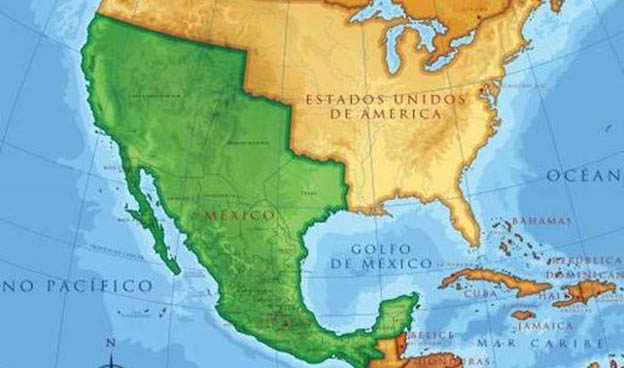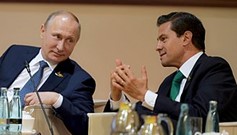|
|
|
|
The weekly newsletter of the México Solidarity Project |
|
|
|
April 6, 2022/ This week's issue/ Meizhu Lui, for the editorial team |
|
|
México, the Ukraine War, and Echoes of 1848 |
|
The United States and México used to be quite similar in geographic size — until 1846 when the US trumped up excuses to start a war with México. At that war’s end in 1848, the US annexed 40 percent of México’s territory, a move that suddenly changed the relationship between the two nations to big vs. small country.
Russia’s current attempt to annex territory from neighboring Ukraine cannot fail to stir up this painful memory. But the war also creates a dilemma within México. Yes, any encroachment on an existing nation needs to be staunchly condemned. But, on the other hand, Russia has never grabbed México’s land, exercised control over Mexico’s politics, or grown rich at México’s expense. The United States has. And the US, ever since the Monroe Doctrine in 1823, has also claimed the right to keep all of Latin America on a short leash.
Now the US, in the Ukraine crisis, is proclaiming its support for non-intervention and democratic rights. Should we wonder why suspicion about US intentions runs deep in the Mexican psyche? In our interview this week, Pedro Gellert, a veteran observer of the Mexican scene, helps us understand how México’s conflicting currents are manifesting themselves within the Mexican left and the policies of Mexican President López Obrador.
No one knows what the outcome of this conflict is going to be. But one result seems sure: The world order will never be the same. México may not be a major player in this conflict, but every nation will need to find its place in the new world ahead. For all of us who believe in the right of peoples to self-determination, let’s hope that this war doesn’t end up as Ukraine’s 1848. |
|
|
|
Don’t miss an issue. Subscribe to the weekly México Solidarity Bulletin! |
|
|
|
|
México Responds to the Crisis in Ukraine |
|
Pedro Gellert lives and works in México City. A veteran activist in global solidarity circles, he’s worked to defend Cuba’s sovereignty and helped found the Coordinadora de Solidaridad con Palestina. Gellert has also been an active contributor to the México Solidarity Project. Gellert currently edits Morena’s international bulletin for Morena, but he speaks here as a participant in and keen observer of the Mexican left.
All nations look at other nations through the lens of their own histories. How does the world look from México’s vantage point? |
|
|
The people of México haven’t fully controlled their own destiny since the Spanish colonization began 500 years ago. México today is much smaller and poorer than its “Big Brother” next door. That “Big Brother” seized more than a third of its territory in 1848 and, since then, has forcibly underdeveloped México. You can hardly find a Mexican who doesn’t carry some historic resentment toward the US. An extreme sensitivity about national sovereignty has become part of our Mexican national culture. So, from its own painful experience, México stands firmly against the forced annexation of the territory of one nation by another. But México also views any actions by the US with suspicion.
What has Mexico’s relationship been with the Soviet Union and then with Russia?
In 1924 México became the first country in the Americas to recognize the Soviet Union. In fact, the first Soviet ambassador to México would be the famous Russian revolutionary and Marxist theorist Alexandra Kollontai. To maintain as much independence from the US as possible, México has always wanted friendly relations with all the countries of the world. Even the Mexican bourgeoisie has been open to relations with communist countries. |
|
Like most of Latin America, México never had a hardcore Cold War mentality. Broad sectors of Mexican society didn’t see the Soviet Union as an “enemy,” in part because the Soviets gave support to Cuba and other national liberation struggles. Mexicans have sympathy and admiration for the Cuban Revolution. During the Cold War era, many Mexican young people went to the USSR to study, and relations between the two countries almost always remained fraternal. |
|
|
Russian President Putin and Mexican President Peña-Nieto in 2017 |
|
But now Russia has encroached on Ukrainian territory. What position is AMLO taking?
First, AMLO has categorically rejected the invasion. Second, he’s calling for a peaceful settlement. Third, in the UN Security Council, México voted in support of the resolution condemning the invasion and, in the General Assembly, co-sponsored a resolution with France condemning Russia’s actions. At the same time, México opposes sanctions and refuses to break relations with Russia and opposes U.S. attempts to drag it into the conflict. México is no one’s colony, AMLO publicly and vigorously proclaims.
What different viewpoints do you see within México, particularly within the left?
Morena has not issued any public statements as a party. I’ve been surprised, in spite of AMLO’s pronouncements, at the tremendous sympathy for Russia inside Morena and the Mexican left. Some believe the Russian propaganda that Russia is fighting neo-Nazism. Some see the war as a proxy struggle between NATO and Russia. Others frame the conflict as between a unipolar world dominated by the US and a multipolar world with several centers of power. A multipolar world, they argue, would be to the advantage of México and other smaller countries, who would have more maneuvering room, especially in relation to the dominant imperialist power. Still others have that not unusual — but flawed, to my mind — reaction that “the enemy of my enemy is my friend.”
Some groups such as the Communist Party of México and Trotskyist organizations strongly oppose the invasion and see both the US and Russia as imperial countries that must be resisted. One unifying theme — disgust at US hypocrisy — does unite the Mexican left. The US has invaded, annexed, meddled, massacred, and organized coups against democratic leaders throughout its history, with much of that imperial behavior happening in Latin America. US support today for Israel’s behavior toward Palestine stands as a prime example of how the US selectively and self-servingly condemns national aggression.
On the right, México’s PAN party has called for breaking relations with Russia. Why? My sense: Knee-jerk opposition to AMLO, not any ideological position, is driving this PAN position. Breaking relations does not, overall, have any significant public support. Frankly, the situation in Ukraine has not become a major public issue. Most people do not see the war as affecting México one way or another.
But isn’t the war affecting the entire world’s economy, México’s included?
I see a mixed outlook. With México a major oil producer, the rise in oil prices could help the Mexican economy. On the other hand, México imports wheat, and the war has those prices rising as well. México — like the rest of the world — is just beginning to feel the impact of this war. No one can be sure about its ultimate impact. The one certainty: The Mexican people feel committed to a world that resolves national conflicts peacefully. |
|
|
Mexico Takes on the Yanqui ‘Merchants of Death’ |
|
Last year, on August 4, the government of México sued a number of US gun manufacturers for “facilitating” the trafficking of huge amounts of guns into México. Nearly all these guns end up in the hands of criminal pistoleros working for the drug carteles, the supposed main target of the racist US “War on Drugs.” |
|
With this lawsuit, Mexico has become the first foreign government to sue the US gun industry’s major players, our epoch’s literal “merchants of death.” In search of profits, gun makers like Glock, Colt, and Smith & Wesson annually maneuver into México tens of thousands of illegal weapons. They follow the same playbook in Guatemala, Honduras, and El Salvador. |
|
|
The likely fate of the Mexican government’s lawsuit remains unclear. But the suit already represents a striking challenge to the US gun makers’ longstanding legal shield.
México itself does have quite strict gun laws, but the yanqui death merchants, working through middlemen with ties to corrupt government officials, regularly find a way to score their enormous gun profits. Some 70 to 90 percent of guns found at Mexican crime scenes come from the United States. The sin verguenza US gun merchants even utilize iconic Mexican imagery — Emiliano Zapata, for instance — to sell their deadly products to Mexican pistoleros. And the label “merchants of death” in no way exaggerates the carnage the US gunmakers cause. The Mexican government estimates that 17,000 homicides in Mexico have a link to illicitly trafficked weapons.
The imperial US has invaded Mexico many times. But these days, no need to bother sending troops. The US instead utilizes economic movidas like NAFTA and maquiladoras to steal México’s wealth. In this environment, gun smuggling serves as just another source of super-profits — and these super-profits are driving the violence and chaos that stands in the way of Mexican sovereignty and equitable economic development.
With the new gun lawsuit, México has stood up the death dealers. And the first to support México’s challenge in el Norte should be the Chican@-Latin@ and African American communities that all suffer from the tragic and ongoing epidemic of gun violence. All of us who believe in justice should stand up with México in its efforts to hold the yanqui gun makers accountable. Si se puede! |
|
Bill Gallegos, a long-time Chicano |
|
|
|
Recent news reports and commentaries, from progressive and mainstream media,
Amy Stillman, AMLO Declines to Make Concessions Over Mexican Electricity Bill, Bloomberg News. The controversial bill would boost the power of the state utility and weaken private operators.
Bryan Pitts, Latin America and the New Non-Aligned Movement, Brasil Wire. México has for nearly a century largely followed the non-interventionism of the 1930s-era Estrada Doctrine.
México criticizes quick aid to Ukraine amid delays in investment to Central America, Reuters. López Obrador has long pressed the United States to invest more in Central America to help tackle the causes of migration.
John Ackerman, Sabotaje a la ratificación de López Obrador, La Jornada. Como si fuera un partido de oposición, el Instituto Nacional Electoral milita abiertamente en contra del Presidente de la República.
México’s López Obrador inaugurates new international airport, Al Jazeera. The new airport has been built for less than half the cost of his predecessor’s now-ended airport project, whose foundations are now sinking into what had once been a lakebed.
Ana Isabel Martinez, Mexican President Eyes Food Price Controls if Inflation Stays High, Reuters.
México to rent out unwanted presidential jet for parties, Agence France-Presse. Former president Felipe Calderon bought the jet for $218 million. AMLO has never used it. |
|
|
The Mexico Solidarity Project brings together activists from various socialist and left organizations and individuals committed to worker and global justice who see the 2018 election of Andrés Manuel López Obrador as president of México as a watershed moment. AMLO and his progressive Morena party aim to end generations of corruption, impoverishment, and subservience to US interests. Our Project supports not just Morena, but all Mexicans struggling for basic rights, and opposes US efforts to undermine organizing and México’s national sovereignty.
Editorial committee: Meizhu Lui, Bruce Hobson, Bill Gallegos, Sam Pizzigati, Courtney Childs, Victoria Hamlin, Agatha Hinman, Steven Hollis. To give feedback or get involved yourself, please email us! |
|
|
|
Web page and application support for the México Solidarity Project from NOVA Web Development, a democratically run, worker-owned and operated cooperative focused on developing free software tools for progressive organizations. |









